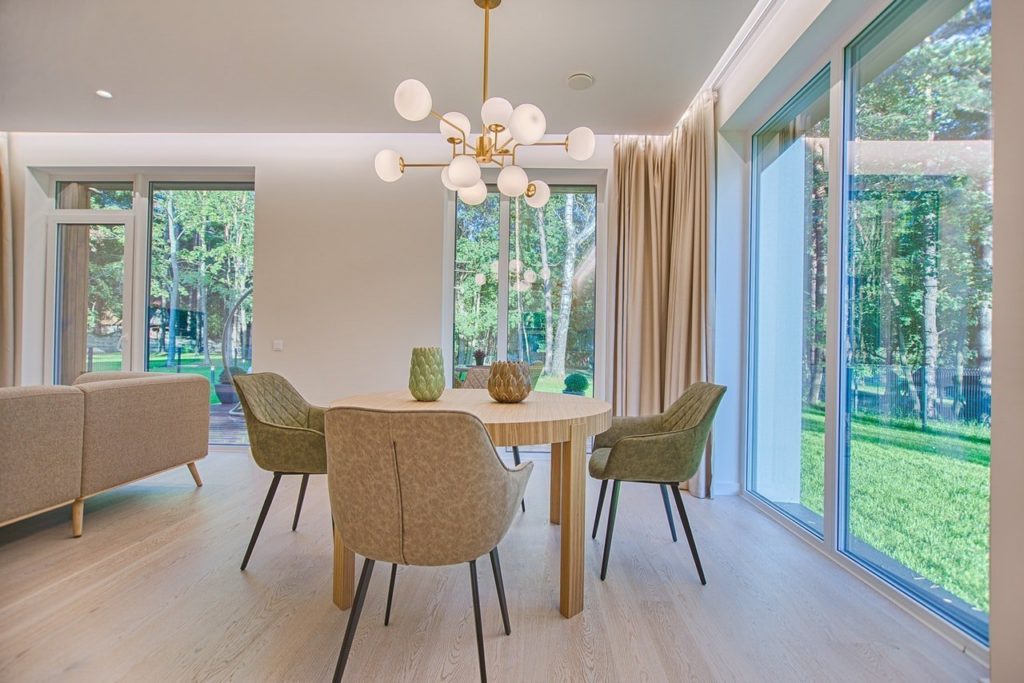
Vinyl flooring is an awesome option in flooring today. It’s come a long way from grandma’s vinyl in the 1980s to the Luxury Vinyl Planks available today. However, it’s not the perfect solution for all situations. Let’s explore the pros and cons of vinyl flooring to see if it’s the right option for you.
Pro: Easy and affordable (installation and materials)
Vinyl flooring is one of the most economical flooring options. Flooring installation is effortless and quick.
Vinyl flooring can be installed using the floating method (similar to laminate flooring), which can save on demo costs. There’s a click-lock mechanism that allows the joints to lock.
You can install vinyl flooring over an existing floor (subfloors) like concrete, existing tile, plywood, etc. You just have to make sure that the subfloor is relatively flat and stable.
Because of its ease, the installation fee is usually very affordable ranging from $1.50 to $2.50 per square foot. If you want the biggest savings, just install it yourself!
Here’s a video of how you can install luxury vinyl plank flooring using the floating method:
Con: Inexpensive (Resale Value)
However, due to vinyl’s perception, it doesn’t contribute to your property’s resale value.
Even though you may have a high quality, luxury vinyl plank floor that looks great and is durable for years, it doesn’t improve your equity.
So, if you want to invest in improvements in your property and you’re planning to resell it in the near future, we recommend hardwood floors instead. They have an excellent return-on-investment.
Pro: Water-resistant
Vinyl floors are water-resistant and/or waterproof in a lot of cases. What that means is the whole product itself: the wear-layer, the middle core, and the backing –typically a cork or a memory foam type pad– are all waterproof.
This is the perfect solution for wet areas in the home, such as your laundry room, dining room, powder room, and kitchen.
This is also the best solution for places that have hot, moist, and humid climates like South Florida or anywhere in the Southeastern States from Virginia to Texas.
Vinyl flooring is of high quality and a great option for active households that have kids and pets*.
Con: Not impact and scratch-resistant
*Speaking of pets, vinyl flooring is ONLY going to be applicable to cats and little dogs. If you have large dogs, you need to have their nails clipped regularly as vinyl flooring is not that durable from scratches.
Although some variants of vinyl have durable wear-layers, they aren’t that thick so sanding, refinishing, or repainting damages is not possible.
Also, vinyl flooring is not impact-resistant so if you have heavy furniture, we highly suggest buying felt pads or “furniture socks” to help prevent dents and scratches.
Pro: Comes in different shapes and sizes
Vinyl manufacturing and production have improved tremendously when it comes to design and options. You can have a huge variety of designs and textures.
Luxury Vinyl Planks look just like real wood flooring. It can have textures, grains, and even knots that look and feel like real wood. The planks start 6 inches wide by 36-inch lengths. Wider and longer options are available to give the room a more open, more airy feel.
Luxury Vinyl Tile, on the other hand, can look like stone or tile. Typically, these tile floors have some box-shaped varieties particularly measuring 18” by 24” or 12” by 24”. They can even look like a Korean marble or a travertine-type material.
Con: A Fairly New Material
Vinyl flooring has been here for decades. However, the vinyl flooring we have now, especially the luxury ones, have only been here for 2 – 3 years so we don’t really know what the long-term effects of using vinyl flooring on your property or how long do they really hold up.